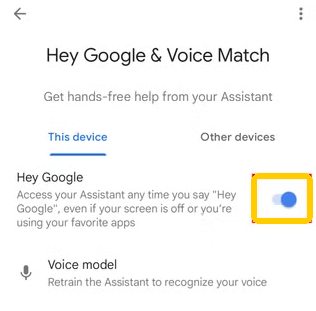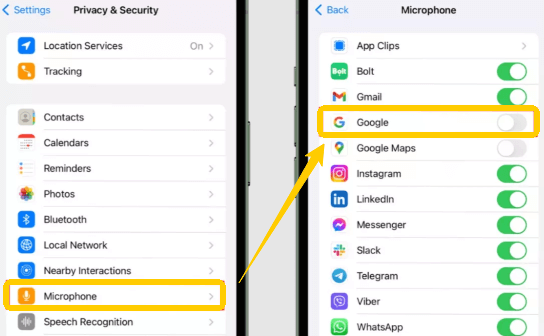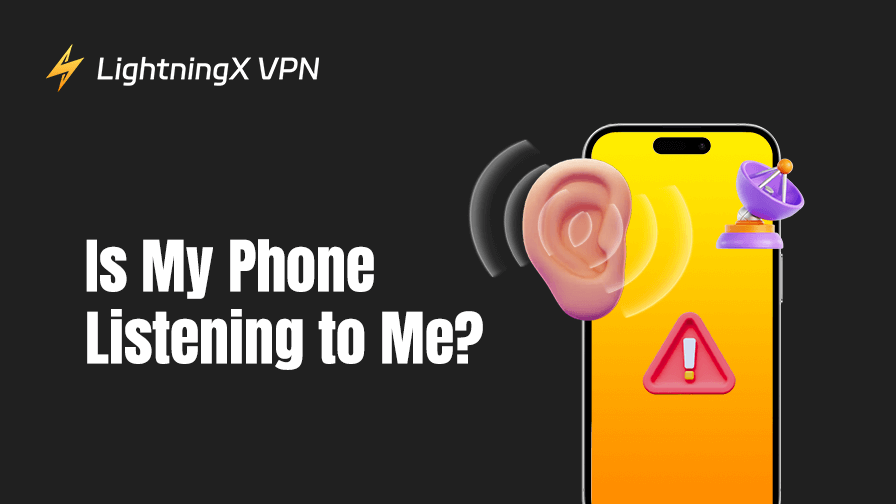Have you ever talked about a product only to see an ad for it minutes later?
Is my phone listening to me? Yes, but it’s not just your smartphone that’s listening to your conversations. Voice assistants, targeted ads, and app permissions all play a role.
This article explores whether your phone is actually listening, how to check if it is, and what you can do to protect your privacy.
Why is My Phone Listening to Me?
You may have noticed that your phone constantly listens to you. So why does this happen? And is it something to worry about? Let’s break it down.
Voice assistants are always ready to help
Your phone mainly listens to your voice, so voice assistants like Siri, Google Assistant, and Alexa can work properly. These virtual assistants are always “listening” for wake words like “Hey, Siri” or “OK, Google.” Once they hear it, they’re ready to help you with tasks like setting reminders, making calls, or playing music.
Showing targeted ads
While voice assistants are helping you, they also collect data from your voice searches and other activities. This data is often used to show you ads that are more relevant to your interests. This is similar to how your search history affects the ads you see. For example, you might see a product pop up in your social media feed right after you’ve been talking to a friend about it.
Third-party apps listening
Some apps, especially social media or GPS apps, request access to your microphone to record videos or send voice messages. However, some apps can abuse this permission and collect unnecessary data or even eavesdrop on sensitive conversations.
How Do I Check If My Phone is Listening to Me?
If you suspect your phone is listening to your conversations, there is a simple test you can do to find out. Here’s how:
Step 1: Start a topic you don’t usually talk about
Choose a topic you’ve never looked up or shown any interest in. For example, you could talk about VPNs if you haven’t used one. Test if your phone is listening to you by choosing something unrelated to your past searches or online behavior.
Step 2: Talk about it near your phone
Now, talk about this topic out loud near your phone. Try using relevant phrases and keywords like “VPN prices,” “best VPN,” or “Are free VPNs safe.” Make sure to bring up the topic in a natural conversation rather than looking it up online with your phone. You can talk about it frequently over the next few days.
Step 3: Monitor the ads you see
After you’ve discussed the topic, keep an eye out for ads popping up on your social media feeds, search results, or even YouTube. If you suddenly start seeing ads related to your chosen topic, this is a sign that your phone may have been listening to you.
Following the steps above, you can check if your phone is listening to you. If you’re concerned about privacy, read on to learn how to stop your phone from listening.
How to Stop My Phone from Listening to Me?
If you’re worried about your phone listening to your conversations, take 3 ways to stop it. Here are some tips to help you turn off your phone’s listening capabilities:
1. Disable your phone’s voice assistant
Most phones have built-in voice assistants like Siri and Google Assistant that are always listening to your commands. To stop your phone from constantly listening, you can disable these assistants.

iPhone (Siri)
- Go to Settings.
- Tap Siri & Search.
- Turn off Listen for “Hey Siri” and Press Side Button for Siri.
- When prompted, tap Turn Off Siri.
Android (Google Assistant)
- Open the Google app.
- Tap your profile picture in the top right corner.
- Select Google > Account Services > Search, Assistant & Voice.
- Toggle off Google Assistant.
- Tap “Turn off” to confirm.
iPhone (Google Assistant app)
- Open Settings.
- Scroll to Google Assistant.
- Toggle Microphone off or uninstall the app if you don’t need it.
2. Turn off microphone access for apps

Many apps request microphone access for features like voice recording or messaging. You can disable this permission to prevent apps from listening to you.
- iPhone: Go to Settings > Privacy > Microphone. Select and turn off the apps that don’t need microphone access.
- Android: Go to Settings > Privacy > Permission Manager > Microphone. Select the app and toggle “Don’t allow microphone access.”
3. Cover the microphone (optional)
If you want extra security, you can cover your phone’s microphone with tape or a phone case. But you need to remove it when making calls or recording audio.
With the above steps, you can ensure that your phone is no longer listening to you, allowing you to better protect your privacy.
How to Avoid Your Phone Listening to You
The above solutions can effectively help you stop your phone from listening to you, but if you are still concerned about your online privacy, take the following solutions.
1. Use a trusted virtual assistant
While voice assistants are useful, they also constantly listen to voice commands. To avoid eavesdropping on your conversations, use a trusted assistant like Siri, Google Assistant, or Amazon Alexa, and download them from the official app store. If you don’t need them, consider disabling or deleting them.
2. Review app permissions
Apps often request permissions like access to your camera or microphone, even if they don’t need them. Check app permissions and disable apps that don’t need microphone access.
3. Use a VPN (Virtual Private Network)
A VPN encrypts your internet traffic, preventing third parties from tracking your online activities. It doesn’t prevent your phone from listening to your voice directly, but it does add a layer of security and privacy. VPNs can also help you avoid targeted ads based on your online behavior.
LightningX VPN is a good choice! It has over 2000 global servers in 50+ countries, which can hide your IP and ensure top encryption for private browsing.
You can use it to unblock websites such as Netflix, ChatGPT, Hulu, Deepseek, etc., without speed and bandwidth limitations. It promises a 0-logging policy and does not collect user information. Download now to enjoy a free trial and get $3 cashback!
4. Install antivirus software
Antivirus software helps protect your phone from malware that monitors your behavior. By installing a good antivirus software, such as Bitdefender Antivirus Plus or Norton 360 Antivirus, you can reduce the risk of your phone being hijacked and your conversations being listened to without your consent.
5. Update your phone system and apps regularly
Make sure your phone’s operating system and apps are always up to date. Updates often include security patches that fix vulnerabilities that hackers could use to access your device.
6. Avoid downloading apps from unknown sources
When downloading apps, stick to the official app stores (Google Play Store for Android or App Store for iOS). Malicious apps from untrusted sources may contain spyware or malware.
Read more: How to Get Rid of Malware [Beginner-friendly Guide]
Is It Legal for My Phone to Listen to Me?
It’s legal, but only if you give it permission.
Your phone can legally listen to your voice if you agree to the app’s terms and conditions and allow microphone access. For example, virtual assistants like Siri, Google Assistant, and Alexa listen to your voice commands because you gave them permission.
It’s illegal if an app or service listens to you without your consent. For example:
- You accidentally download spyware or malware that secretly records your conversations.
- Apps abuse the permissions you give them and listen when they shouldn’t.
Is Your Phone Listening to You for Targeted Ads?
No, your phone doesn’t secretly listen to your conversations to send ads. However, app companies track your search history, app activity, location, and social media behavior to show targeted ads.
If the ads feel too accurate, it’s usually because of the prediction algorithm or data sharing between apps. You can reduce tracking by:
- Turn off microphone access for unnecessary apps.
- Adjust ad settings on Google, Facebook, and Instagram.
- Use a VPN to hide your online activity.
- Clear your search and app history regularly.
Your phone may not spy on you, but data tracking is real!
Final Thoughts
Is your phone listening to you? Of course! Your phone’s microphone can pick up voice commands, and app companies track your online activity, searches, and interactions to deliver targeted ads.
If you’re concerned about privacy, adjusting your phone’s settings (disabling voice assistants, reviewing app permissions, and using security tools like VPNs) can help protect your data.















